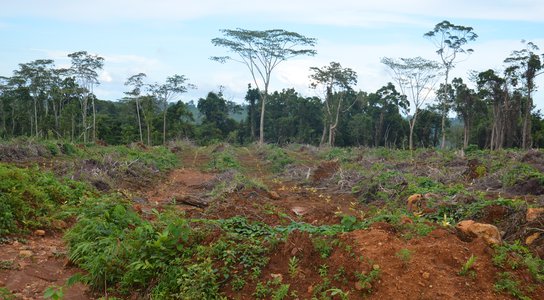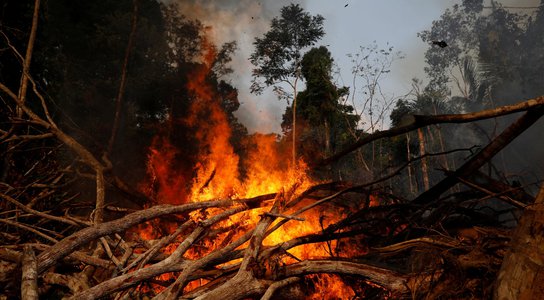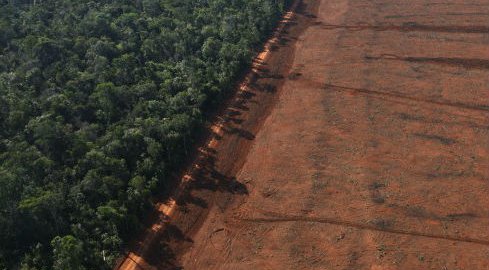- New Global Witness investigation uncovers how major global financiers are indirectly financing a damaging logging project in Papua New Guinea that is highly likely to be illegal.
- This has not only destroyed swathes
of highly biodiverse climate-critical forest, but is linked to
exploitation of local communities and alleged human rights abuses.
- The NGO uncovers how Chinese companies buying timber from Maxland could be subject to stronger restrictions under revisions to China’s Forest Law.
- Findings also expose how the activities of the company at the centre of these claims - Maxland – is aided and abetted are enabled by a complex global web of companies.
Monday 11th May 2020 - A new investigation from anti-corruption NGO Global Witness has uncovered how global financial institutions - including the likes of Blackrock and the Norway Government Pension Fund - are backing Malaysian banks linked to a hugely destructive logging project in Papua New Guinea.
Located in the south-western Pacific Ocean, north of Australia, Papua New Guinea contains some of the world’s most climate-critical rainforests, and is one of the planet’s largest and most vital biodiversity hotspots.
Despite the urgent need to preserve biodiversity and forests in the fight against climate breakdown, Papua New Guinea continues to see catastrophic levels of deforestation, which carries a huge impact on local communities too.
The new Global Witness investigation exposes how a Malaysian company, Maxland, is using a seemingly fraudulent rubber plantation on Manus Island in Papua New Guinea apparently as a front for illegal logging.
The investigation found Maxland is not only destroying thousands of climate-critical trees for profit - but also failing to honour promises of a new road and rubber plantation, in return for access to the forests in the first place.
Even more worrying are villager concerns about the project and apparent human rights abuses as a result of Maxland’s activities - in one case with a protest against the logging allegedly leading to a violent beating of a protestor.
The money trail that funds Maxland’s operations also reaches across the world, via Malaysian banks that lead back to investment bank Blackrock, Norway’s Government Pension Fund, the Vanguard Group, Inc., J.P. Morgan Asset Management (Singapore) Limited, T. Rowe Price Associates, Inc., Dimensional Fund Advisors of Texas and the California Public Employees’ Retirement System (CalPERS).
Now, Global Witness has also revealed that Maxland has a mother company with a track record of destroying forests with bogus promises of development. Against this backdrop, the NGO is calling for stronger regulation to stop the flow of financing of projects like these.
Lela Stanley, Global Witness said:
“A damaging lack of regulation, coupled with little effort from the actors involved to undertake due diligence on the environmental impacts of their financing, means that protections of forests, communities and biodiversity have been immensely weakened.”
“There are concrete actions that we can take now to curb this kind of destruction. Governments can make it binding for due diligence measures to be followed by its investors and companies - both at home and abroad - and strengthen forest laws to stop illegal timber being imported to their shores.”
Additional concerns have been raised about Maxland’s owner - international businessman Thomas Hah. The report reveals how his shadowy web of business interests encompasses firearms and cryptocurrency, spreading out from China and Hong Kong to secrecy jurisdictions such as the Cayman Islands - and now apparently illegal logging in Papua New Guinea.
“Financiers and companies can take responsibility, and apply more robust checks on their supply chains and financing, to stop players like Maxland and Thomas Hah getting the upper hand over our planet and its people,” Stanley added.
/ ENDS
Contacts
Notes to editor:
- Interviews are available on request. Please contact Heather Iqbal at [email protected]
- Video content and photographs are available here.
- An embargoed copy of the investigation ‘Bending the Truth’ published by Global Witness is available on request.
- The Global Witness’ report ‘Money to Burn’ outlines how over 300 financial institutions, headquartered across the globe, all contributed to a $44 billion financing for companies deforesting the three largest rainforest regions in the world to draw from. This can found here.
Global Witness contacted Maxland, Thomas Hah and the other companies named in our investigation for comment. Responses where provided can be found in our report.
You might also like
-
Article Bending the Truth
Purported rubber plantation on Papua New Guinea’s Manus Island is a highly likely front for illegal logging
-
Article Money to Burn
More than 300 banks and investors back six of the world’s most harmful agribusinesses to the tune of $44bn
-
Briefing Strengthening corporate responsibility
The case for mandatory due diligence in the EU to protect people and the planet